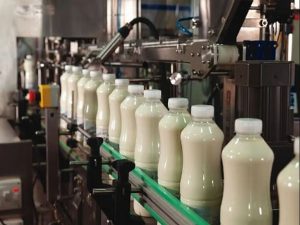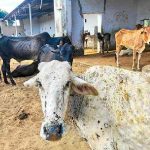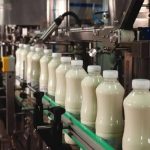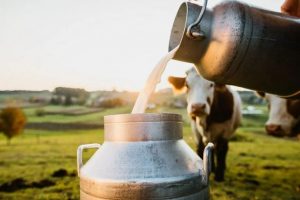
It is recommended that governments and industry bodies must work together to provide subsidies, training, and support systems to make these technologies accessible to all dairy farmers.
Biosafety in dairy farming has become an essential aspect of modern agricultural practices, as infectious diseases can severely impact animal health, milk production, and overall profitability.
With evolving challenges such as antimicrobial resistance, climate change, and the increasing need for sustainable farming, the integration of advanced technologies for infection control has gained prominence. Let’s explore how innovations in biosafety are reshaping dairy farming and ensuring healthier, more productive herds.
Importance of biosafety in dairy farms
Biosafety involves implementing measures to prevent, control, and mitigate the risk of infectious diseases. In dairy farming, diseases such as mastitis, brucellosis, and bovine respiratory infections can have devastating effects, leading to lower milk yields, increased veterinary costs, and compromised food safety.
An effective biosafety program is not only vital for animal welfare, but also critical for sustaining profitability and meeting stringent food quality standards.
New technologies revolutionizing biosafety
There are several new technologies that have come up.
Automated monitoring systems: Real-time monitoring systems equipped with sensors and IoT (Internet of Things) technology are transforming the way dairy farms manage herd health. These systems can track critical parameters such as body temperature, movement patterns, and milk yield, providing early warnings for potential infections.
For example, wearable devices on cows can alert farmers to changes in health indicators, enabling timely interventions and reducing disease outbreaks.
Ultraviolet (UV) disinfection systems: UV disinfection has emerged as a powerful tool for maintaining farm hygiene. UV technology is used to disinfect water, air, and surfaces, eliminating pathogens without the use of chemicals. For dairy farms, UV-treated water ensures clean drinking water for the herd, while air purification systems in barns help reduce airborne transmission of respiratory diseases.
Automated cleaning and sanitization: Robotic systems for cleaning barns and milking equipment are becoming increasingly common in advanced dairy farms. These systems ensure thorough and consistent cleaning, reducing the chances of contamination.
Automated milking systems with integrated cleaning cycles are particularly effective in preventing mastitis, a common infection caused by unclean milking equipment.
Vaccination delivery innovations: Vaccination is a cornerstone of infection control in dairy farming, and new technologies are enhancing its effectiveness. Needle-free injection systems and automated vaccination devices reduce stress for animals and improve vaccine administration.
Additionally, advances in vaccine formulations, such as intranasal or oral vaccines, provide more convenient and effective ways to protect dairy herds.
Probiotic and prebiotic feed additives
Maintaining a healthy gut microbiome in dairy cattle is essential for boosting immunity and preventing infections. Probiotic and prebiotic feed additives are being used to promote beneficial gut bacteria, which enhance the animal’s natural defences against diseases. These supplements are also a sustainable alternative to antibiotics, addressing concerns about antimicrobial resistance.
Advanced pathogen detection systems: Early detection of pathogens is critical for controlling infections on dairy farms. New diagnostic tools, such as portable PCR (polymerase chain reaction) devices, allow farmers to detect disease-causing agents in milk, feed, or water samples within hours. These rapid tests enable immediate action, minimising the spread of infections.
Biodegradable biosafety products: To align with sustainability goals, farms are adopting biodegradable and eco-friendly biosafety solutions. For instance, biodegradable disinfectants and footbath solutions reduce chemical residues on farms, ensuring safer environments for animals, workers, and the ecosystem.
Benefits of adopting new biosafety technologies
The integration of these advanced technologies offers numerous benefits for dairy farms, including:
Improved animal health: Reduced disease incidence ensures healthier herds and higher milk yields.
Cost savings: Early detection and prevention of infections lower veterinary expenses and production losses.
Enhanced productivity: Healthier animals translate to consistent and higher-quality milk output.
Food safety assurance: Stringent infection control measures improve the quality and safety of dairy products.
Sustainability: Eco-friendly solutions minimize the environmental impact and promote responsible farming practices.
Challenges in implementation
Despite the clear advantages, implementing biosafety technologies can be challenging for smaller farms due to high initial costs and a lack of technical expertise.
Governments and industry bodies must work together to provide subsidies, training, and support systems to make these technologies accessible to all dairy farmers.
The future of dairy farm biosafety lies in the continued development and adoption of innovative technologies. With advancements in artificial intelligence, machine learning, and biotechnology, the potential for smarter and more efficient biosafety solutions is immense. For example, predictive analytics can help farmers anticipate disease outbreaks based on environmental and herd data, further revolutionizing infection control.
Biosafety is no longer just an optional practice, but a fundamental necessity for the success of dairy farming. By embracing new technologies for infection control, dairy farms can safeguard their herds, enhance productivity, and contribute to a sustainable agricultural ecosystem.
As these innovations become more accessible, they will play a crucial role in shaping the future of the dairy industry, ensuring healthier animals and higher-quality dairy products for consumers worldwide.
— Ravin Saluja, Director. Sterling Agro Industries Ltd (Nova Dairy Products).
You can now read the most important #news on #eDairyNews #Whatsapp channels!!!
🇮🇳 eDairy News ÍNDIA: https://whatsapp.com/channel/0029VaPidCcGpLHImBQk6x1F
















